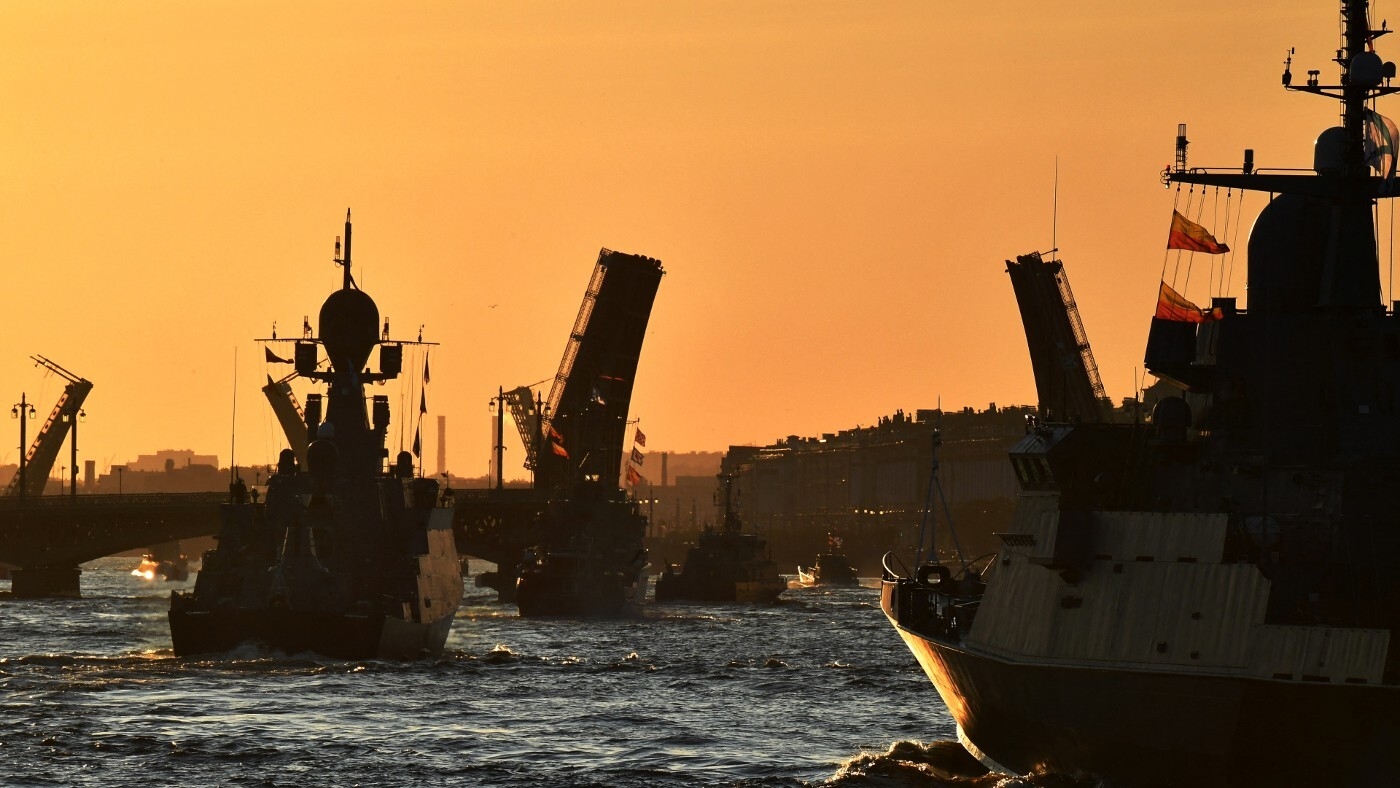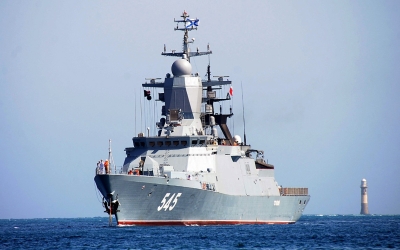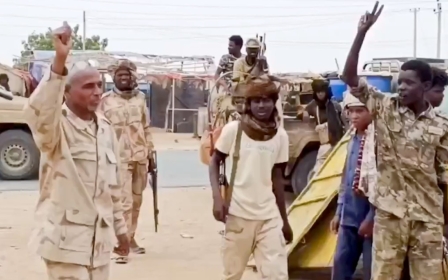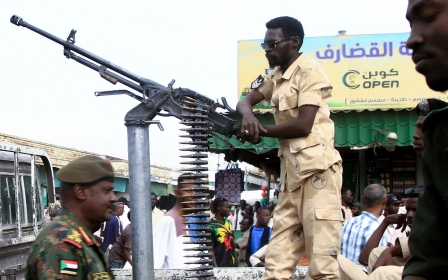Sudanese delegation visits Russia as Red Sea base moves forward

Top Sudanese officials are on an official visit to Saint Petersburg, with sources telling Middle East Eye that controversial plans for a Russian naval installation on Sudan's Red Sea coast were going ahead.
In recent months, Russia has strengthened ties with Sudan's government, which is dominated by the Sudanese Armed Forces (SAF).
For the past year, Sudan's army has been at war with the paramilitary Rapid Support Forces (RSF), and Moscow has provided the SAF with weapons, fuel and other support despite the Russian mercenary Wagner Group helping supply its enemy.
The Sudanese delegation to Russia is led by Malik Agar, a former rebel leader and current vice president of Sudan's ruling Sovereignty Council. He will be in Russia for several days, accompanied by the Sudanese ministers for foreign affairs, finance and minerals.
During his stay, Agar will meet with Russian President Vladimir Putin to discuss the war and “ways to strengthen” bilateral relations between the two countries, according to the Sovereignty Council.
New MEE newsletter: Jerusalem Dispatch
Sign up to get the latest insights and analysis on Israel-Palestine, alongside Turkey Unpacked and other MEE newsletters
The trip comes a couple of days after Mohamed Siraj, Sudan's ambassador to Russia, told Russian state-owned news agency Sputnik that Sudan was committed to the Red Sea naval installation project, which he characterised as a logistical support centre.
“This is a logistical support point on the Red Sea, and it has been signed between the two countries,” Siraj said. “We are currently reviewing the matter within the framework of our bilateral relations, which I believe are developing positively. We hope to strengthen these ties further.”
On 25 May, Yasser al-Atta, a senior Sudanese general, said that Russia had asked for a fuelling station on the Red Sea in exchange for weapons and ammunition and that agreements with Moscow would be signed soon.
A Sudanese official and others with intimate knowledge of developments confirmed this intent to the Middle East Eye.
The war between the SAF and the RSF began on 15 April 2023. Tens of thousands of people have died and almost nine million Sudanese have been forced to flee their homes as a result of the war.
Levels of hunger and malnutrition are extreme, with a Dutch think tank recently warning that two and a half million people could die from starvation in Sudan by September this year.
Red Sea games
Russia has long sought a presence on Sudan’s 750-km-long Red Sea coastline, which has also drawn interest from various international powers, including the United States, China, Egypt, Saudi Arabia, Turkey and the United Arab Emirates.
Before the war began, Sudan’s Red Sea coast was a site of shadow games as the scramble for its ports intensified.
In February 2023, fishermen in Sudan's deep south told Middle East Eye that they were attacked and expelled from their waters by armed foreigners off an island close to Agig port, south of Port Sudan, near the border with Eritrea.
Witnesses in those southern areas said they were sure there was a foreign military presence on islands inside Sudanese territorial waters.
At the time, one of the Sudanese fishermen told MEE that he believed the armed attackers were Russians, adding that he saw them taking samples from the land.
“We were attacked by some foreigners while we were fishing near Agig port. They were white, and I believe they were Russian because I saw Russians in other parts of the region, and they looked very similar,” the fisherman said, adding that they could have come from another western nation.
The Sudanese army has struggled to overcome the challenge posed by the RSF, which has taken vast areas of territory, including much of Khartoum. In response, the SAF has turned to Iran and Russia, which see an opportunity to boost their influence in East Africa.
A presence on the Red Sea coastline is just one of these dividends. At the end of April, the Russian deputy minister of foreign affairs, Mikhail Bogdanov, met Sudanese army chief Abdel Fattah al-Burhan in Port Sudan, where they discussed the Red Sea base, Ukraine’s military presence in Sudan and the “rich experience” the two countries have in mining projects.
Russian companies have long-standing gold mining interests in Sudan. Western diplomats in Khartoum previously said that the Wagner Group was working with the family of Mohamed Hamdan Dagalo, the RSF chief better known as Hemeti, to ship gold out of the mines of Darfur.
Hemeti and his family own a gold mining company that operates on lands he seized in the vast western region of Sudan in 2017. He has talked openly about not being the “first man to own goldmines”, but they provide him and the RSF with a key source of its power and wealth.
Speaking to Middle East Eye in April 2023, a US official based in North Africa said that an estimated 32.7 tonnes of gold, worth an estimated $1.9bn, were smuggled out of Sudan on 16 charter flights between February 2022 and February 2023.
The cargo was sometimes flown to a Russian-controlled airbase in Syria and was always labelled as cookies, the official said. Moscow has used it to help keep its economy afloat following its invasion of Ukraine.
US absence
As Russia strengthens in Sudan, the US is nowhere to be seen. Last week, US Secretary of State Antony Blinken spoke to Burhan on the phone.
However, the call went down badly in Sudanese army circles after Blinken urged the Sudanese army chief to return to peace talks with the RSF. The US and Saudi Arabia have sponsored a series of ill-fated dialogues in the Saudi port city of Jeddah.
“We will not go to Jeddah and whoever wants us to should kill us in our country and take our bodies there,” Agar said the day after the Blinken call.
Meanwhile, MEE understands that Saudi Arabia and Egypt are not happy about the prospect of a Russian presence in the Red Sea.
'US diplomacy is like a bad Netflix series'
- Cameron Hudson, senior fellow for CSIS Africa
Cameron Hudson, a former US State Department and CIA analyst now at the Center for Strategic and International Studies (CSIS), told Middle East Eye that Blinken's call to Burhan "showed how out of touch we are".
“We can’t just have Blinken parachute in once a year and expect to kickstart a process," Hudson said.
"People might not like the idea of Russia cruising around the Red Sea, but Egypt and Saudi Arabia aren’t doing anything to help SAF militarily. If literally anyone, other than Iran, was stepping up to help SAF, then we wouldn’t be talking about Russia now.”
Hudson said that Blinken had "completely misread" the Sudanese army's current position and that the Jeddah process was “a laughing stock that the US is for some reason trying to repeat for no other reason that it has no better option”.
“It’s hard to know what will get Washington’s attention at this point,” Hudson said, referring to the return of the prospect of a Russian Red Sea base, which was first agreed upon during the days of Sudanese autocrat Omar al-Bashir.
“Our diplomacy is like a bad Netflix series,” he said.
Middle East Eye delivers independent and unrivalled coverage and analysis of the Middle East, North Africa and beyond. To learn more about republishing this content and the associated fees, please fill out this form. More about MEE can be found here.





